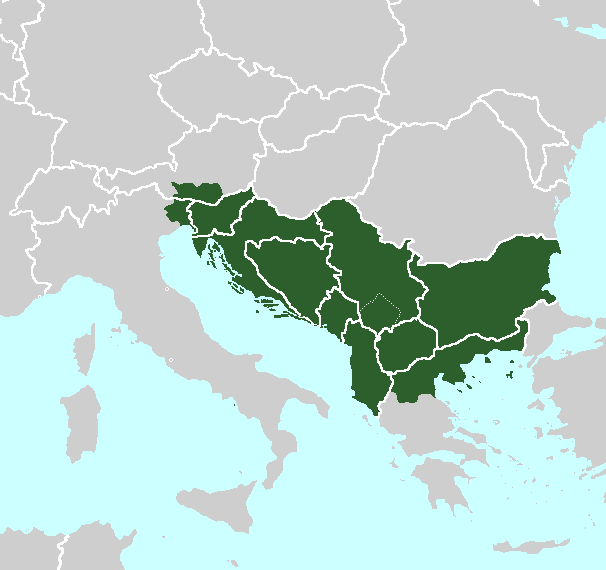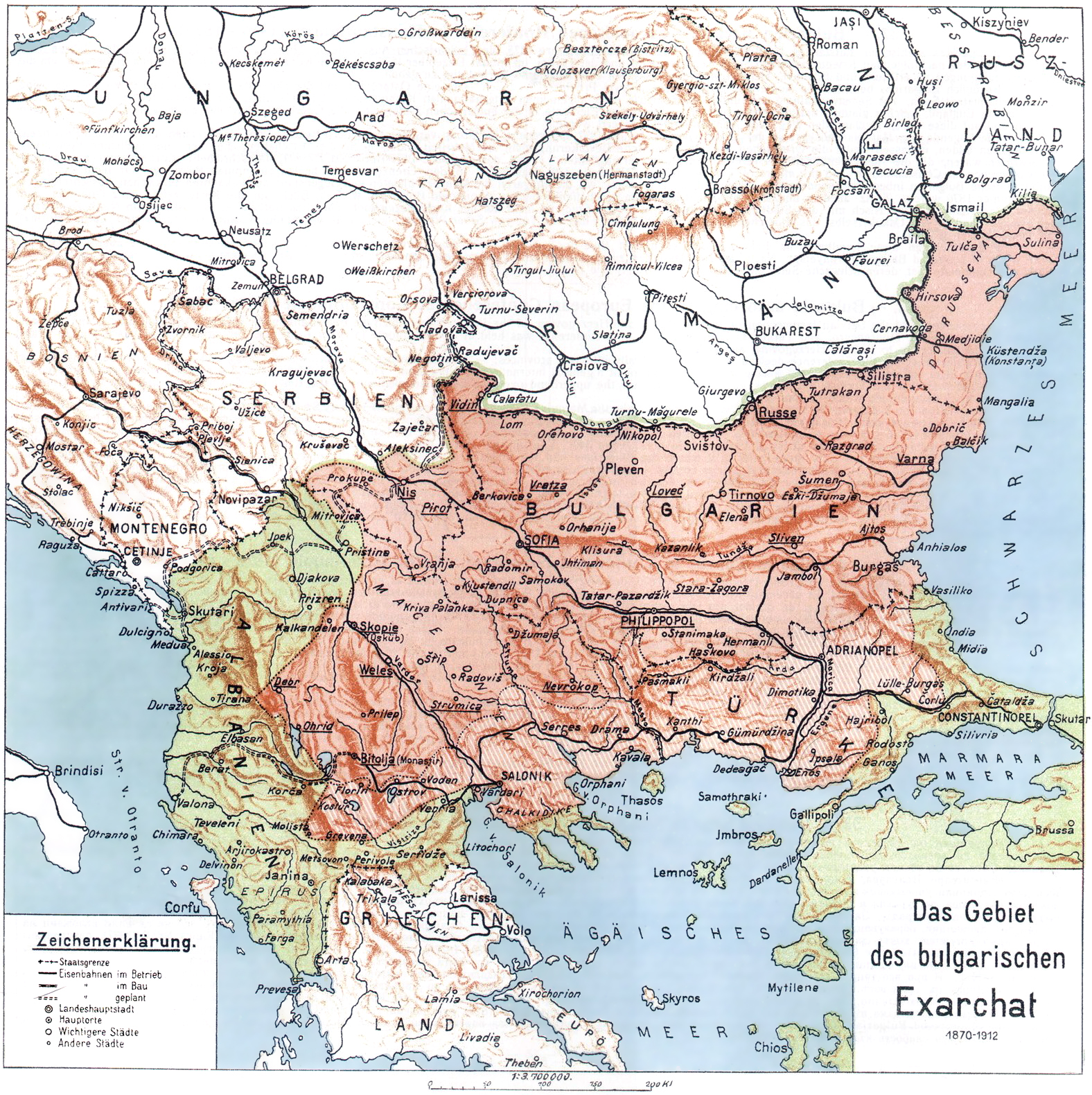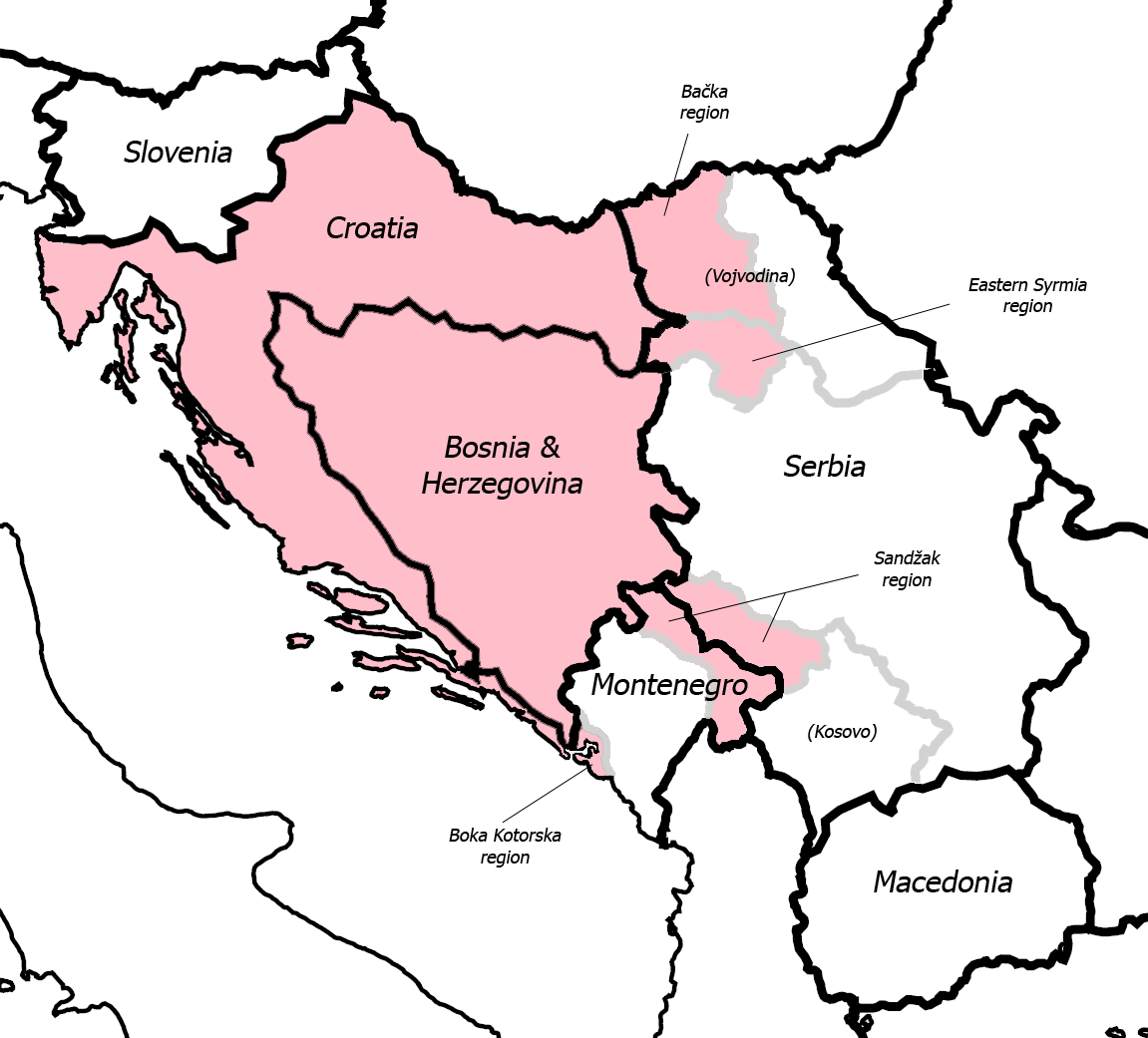|
Greater Yugoslavia
Yugoslav irredentism was a political idea advocating merging of South Slav-populated territories within Yugoslavia with several adjacent territories, including Bulgaria, Western Thrace and Greek Macedonia. The government of the Kingdom of Yugoslavia sought the union with Bulgaria or its incorporation into Yugoslavia. Since 1945, the Socialist Federal Republic of Yugoslavia under Josip Broz Tito sought to create an integral Yugoslavia that would incorporate within its borders: Greek Macedonia and Thrace, Albania, Bulgaria, portions or entire Austrian Carinthia, and for a time the entire Italian region of Friuli-Venezia Giulia. History Proponents of Yugoslav irredentism included both monarchists and republicans. Days prior to Yugoslavia's creation in 1918, Yugoslavist politician Svetozar Pribićević declared that Yugoslavia's borders should extend "from the Soča up to Salonika". Proposals in the interwar period to include Bulgaria within Yugoslavia, included claims by republi ... [...More Info...] [...Related Items...] OR: [Wikipedia] [Google] [Baidu] |
Greater Or Integral Yugoslavia
Greater may refer to: *Greatness, the state of being great *Greater than, in inequality * ''Greater'' (film), a 2016 American film *Greater (flamingo), the oldest flamingo on record * "Greater" (song), by MercyMe, 2014 *Greater Bank, an Australian bank *Greater Media Greater Media, Inc., known as Greater Media, was an American media company that specialized in radio stations. The markets where they owned radio stations included Boston, Detroit, Philadelphia, Charlotte, and the state of New Jersey. The compa ..., an American media company See also * * {{Disambiguation ... [...More Info...] [...Related Items...] OR: [Wikipedia] [Google] [Baidu] |
Constitutional Monarchy
A constitutional monarchy, parliamentary monarchy, or democratic monarchy is a form of monarchy in which the monarch exercises their authority in accordance with a constitution and is not alone in decision making. Constitutional monarchies differ from absolute monarchies (in which a monarch is the only decision-maker) in that they are bound to exercise powers and authorities within limits prescribed by an established legal framework. Constitutional monarchies range from countries such as Liechtenstein, Monaco, Morocco, Jordan, Kuwait, and Bahrain, where the constitution grants substantial discretionary powers to the sovereign, to countries such as Australia, the United Kingdom, Canada, the Netherlands, Spain, Belgium, Sweden, Malaysia, Thailand, Cambodia, and Japan, where the monarch retains significantly less personal discretion in the exercise of their authority. ''Constitutional monarchy'' may refer to a system in which the monarch acts as a non-party political head of ... [...More Info...] [...Related Items...] OR: [Wikipedia] [Google] [Baidu] |
Greater Romania
The term Greater Romania ( ro, România Mare) usually refers to the borders of the Kingdom of Romania in the interwar period, achieved after the Great Union. It also refers to a pan-nationalist idea. As a concept, its main goal is the creation of a nation-state which would incorporate all Romanian speakers.Irina LivezeanuCultural Politics in Greater Romania: Regionalism, Nation Building & Ethnic Struggle, 1918-1930 Cornell University Press, 2000, p. 4 and p. 302 In 1920, after the incorporation of Transylvania, Bukovina, Bessarabia and parts of Banat, Crișana, and Maramureș, the Romanian state reached its largest peacetime geographical extent ever (295,049 km²). Today, the concept serves as a guiding principle for the unification of Romania and Moldova. The idea is comparable to other similar conceptions such as the Greater Bulgaria, Megali Idea, Greater Yugoslavia, Greater Hungary and Greater Italy. Ideology The theme of national identity had been always a key concer ... [...More Info...] [...Related Items...] OR: [Wikipedia] [Google] [Baidu] |
Greater Bulgaria
Bulgarian irredentism is a term to identify the territory associated with a historical national state and a modern Bulgarian irredentist nationalist movement in the 19th and 20th centuries, which would include most of Macedonia, Thrace and Moesia. History The larger proposed Bulgarian state was suggested under the Treaty of San Stefano in 1878. The issue of irredentism and nationalism gained greater prominence after the Treaty of San Stefano. It established a Principality of Bulgaria, with territory including most of Moesia - the plain between the Danube and the Balkan mountains range (Stara Planina), the regions of Sofia, Pirot, and Vranje in the Morava Valley, Thrace - Northern Thrace, parts of Eastern Thrace, and nearly all of Macedonia. This treaty laid grounds for much of the later claims for a Greater Bulgaria. However, the Treaty of San Stefano was a preliminary one, and the borders of the newly created Bulgaria were established in the Treaty of Berlin. It saw t ... [...More Info...] [...Related Items...] OR: [Wikipedia] [Google] [Baidu] |
Greater Croatia
Greater Croatia ( hr, Velika Hrvatska) is a term applied to certain currents within Croatian nationalism. In one sense, it refers to the territorial scope of the Croatian people, emphasising the ethnicity of those Croats living outside Croatia. In the political sense, though, the term refers to an irredentist belief in the equivalence between the territorial scope of the Croatian people and that of the Croatian state. Background The concept of a Greater Croatian state has its modern origins with the Illyrian movement, a pan- South-Slavist cultural and political campaign with roots in the early modern period, and revived by a group of young Croatian intellectuals during the first half of the 19th century. Although this movement arose in the developing European nationalist context of the time, it particularly arose as a response to the more powerful nationalist stirrings in the then-Kingdom of Hungary, with whom Croatia was in a personal union. The foundations of the concept ... [...More Info...] [...Related Items...] OR: [Wikipedia] [Google] [Baidu] |
Yugoslavism
Yugoslavism, Yugoslavdom, or Yugoslav nationalism is an ideology supporting the notion that the South Slavs, namely the Bosniaks, Croats, Macedonians, Montenegrins, Serbs and Slovenes, but also Bulgarians, belong to a single Yugoslav nation separated by diverging historical circumstances, forms of speech, and religious divides. During the interwar period, Yugoslavism became predominant in, and then the official ideology of the Kingdom of Yugoslavia. There were two major forms of Yugoslavism in the period: the regime favoured integral Yugoslavism promoting unitarism, centralisation, and unification of the country's ethnic groups into a single Yugoslav nation, by coercion if necessary. The approach was also applied to languages spoken in the Kingdom. The main alternative was federalist Yugoslavism which advocated the autonomy of the historical lands in the form of a federation and gradual unification without outside pressure. Both agreed on the concept of National Oneness dev ... [...More Info...] [...Related Items...] OR: [Wikipedia] [Google] [Baidu] |
Greater Serbia
The term Greater Serbia or Great Serbia ( sr, Велика Србија, Velika Srbija) describes the Serbian nationalist and irredentist ideology of the creation of a Serb state which would incorporate all regions of traditional significance to Serbs, a South Slavic ethnic group, including regions outside modern-day Serbia that are partly populated by Serbs. The initial movement's main ideology (Pan- Serbism) was to unite all Serbs (or all territory historically ruled or populated by Serbs) into one state, claiming, depending on the version, different areas of many surrounding countries. The Greater Serbian ideology includes claims to various territories aside from modern-day Serbia, including the whole of the former Yugoslavia except Slovenia and part of Croatia. According to historian Jozo Tomasevich, in some historical forms, Greater Serbian aspirations also include parts of Albania, Bulgaria, Hungary and Romania. Its inspiration comes from one-time existence of the relatively ... [...More Info...] [...Related Items...] OR: [Wikipedia] [Google] [Baidu] |
Carinthia
Carinthia (german: Kärnten ; sl, Koroška ) is the southernmost States of Austria, Austrian state, in the Eastern Alps, and is noted for its mountains and lakes. The main language is German language, German. Its regional dialects belong to the Southern Bavarian group. Carinthian dialect group, Carinthian Slovene dialects, forms of a South Slavic languages, Slavic language that predominated in the southeastern part of the region up to the first half of the 20th century, are now spoken by a Carinthian Slovenes, small minority in the area. Carinthia's main Industry (economics), industries are tourism, electronics, engineering, forestry, and agriculture. Name The etymology of the name "Carinthia", similar to Carnia or Carniola, has not been conclusively established. The ''Ravenna Cosmography'' (about AD 700) referred to a Slavic settlement of the Eastern Alps, Slavic "Carantani" tribe as the eastern neighbours of the Bavarians. In his ''History of the Lombards'', the 8th-c ... [...More Info...] [...Related Items...] OR: [Wikipedia] [Google] [Baidu] |
Trieste
Trieste ( , ; sl, Trst ; german: Triest ) is a city and seaport in northeastern Italy. It is the capital city, and largest city, of the autonomous region of Friuli Venezia Giulia, one of two autonomous regions which are not subdivided into provinces. Trieste is located at the head of the Gulf of Trieste, on a narrow strip of Italian territory lying between the Adriatic Sea and Slovenia; Slovenia lies approximately east and southeast of the city, while Croatia is about to the south of the city. The city has a long coastline and is surrounded by grassland, forest, and karstic areas. The city has a subtropical climate, unusual in relation to its relatively high latitude, due to marine breezes. In 2022, it had a population of about 204,302. Capital of the autonomous region of Friuli Venezia Giulia and previously capital of the Province of Trieste, until its abolition on 1 October 2017. Trieste belonged to the Habsburg monarchy from 1382 until 1918. In the 19th century the mon ... [...More Info...] [...Related Items...] OR: [Wikipedia] [Google] [Baidu] |
Axis Powers
The Axis powers, ; it, Potenze dell'Asse ; ja, 枢軸国 ''Sūjikukoku'', group=nb originally called the Rome–Berlin Axis, was a military coalition that initiated World War II and fought against the Allies. Its principal members were Nazi Germany, the Kingdom of Italy, and the Empire of Japan. The Axis were united in their opposition to the Allies, but otherwise lacked comparable coordination and ideological cohesion. The Axis grew out of successive diplomatic efforts by Germany, Italy, and Japan to secure their own specific expansionist interests in the mid-1930s. The first step was the protocol signed by Germany and Italy in October 1936, after which Italian leader Benito Mussolini declared that all other European countries would thereafter rotate on the Rome–Berlin axis, thus creating the term "Axis". The following November saw the ratification of the Anti-Comintern Pact, an anti-communist treaty between Germany and Japan; Italy joined the Pact in 1937, follow ... [...More Info...] [...Related Items...] OR: [Wikipedia] [Google] [Baidu] |
Milan Nedić
Milan Nedić ( sr-Cyrl, Милан Недић; 2 September 1878 – 4 February 1946) was a Yugoslav and Serbian army general and politician who served as the chief of the General Staff of the Royal Yugoslav Army and minister of war in the Royal Yugoslav Government. During World War II, he collaborated with Nazi Germany and served as the prime minister of the puppet government of National Salvation, in the German occupied territory of Serbia. After the war, the Yugoslav communist authorities imprisoned him. In 1946, it was reported that he had committed suicide. He was included in the 100 most prominent Serbs list. There have been attempts since the 2000s to present Nedić's role in World War II more positively. All applications to rehabilitate him have so far been refused by the official Serbian courts. Early life Milan Nedić was born in the Belgrade suburb of Grocka on 2 September 1878 to Đorđe and Pelagia Nedić. His father was a local district chief and his mother w ... [...More Info...] [...Related Items...] OR: [Wikipedia] [Google] [Baidu] |
World War II
World War II or the Second World War, often abbreviated as WWII or WW2, was a world war that lasted from 1939 to 1945. It involved the vast majority of the world's countries—including all of the great powers—forming two opposing military alliances: the Allies and the Axis powers. World War II was a total war that directly involved more than 100 million personnel from more than 30 countries. The major participants in the war threw their entire economic, industrial, and scientific capabilities behind the war effort, blurring the distinction between civilian and military resources. Aircraft played a major role in the conflict, enabling the strategic bombing of population centres and deploying the only two nuclear weapons ever used in war. World War II was by far the deadliest conflict in human history; it resulted in 70 to 85 million fatalities, mostly among civilians. Tens of millions died due to genocides (including the Holocaust), starvation, ma ... [...More Info...] [...Related Items...] OR: [Wikipedia] [Google] [Baidu] |




.png)


